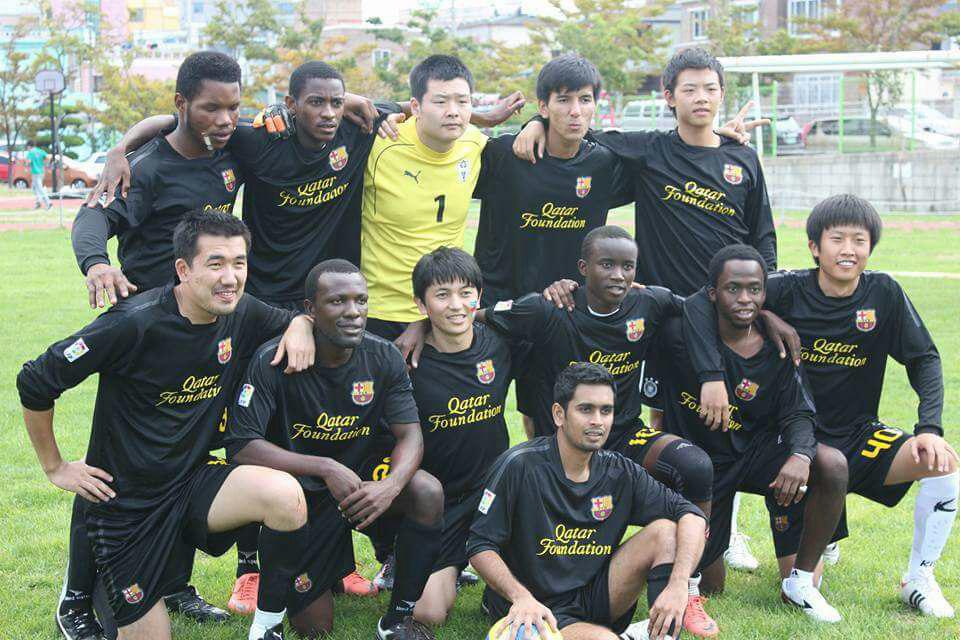We Play Football to Become Family

Written and photographed by Munavvarkhon Karimov (Michael)
Another Saturday evening. Twenty international players on the pitch are panting and sweating while competing with one another to score. Suddenly, a guy from Cameroon receives the ball from his Uzbek teammate near the penalty area and shoots. What a strong shot! And a Korean goalkeeper has no option but to watch the ball go into the goal net. However, no matter which team wins at Chonnam National University (CNU), the purpose is but one: building friendship with overseas students on the campus.
Each semester, over 1,500 international students from 76 countries come to CNU, filling the campus with multicultural diversity. Along with various activities and trips organized by the university, playing soccer (football) on the pitch has been one of the most successful at bringing overseas students into the CNU community.
“Football here helps us to be together as a family,” said Gideon Paul Mbokoso, a Tanzanian student. “We can even learn new culture and languages.”
Many students, when they first go abroad to study, may find it rather challenging to get on well with others. It may lead to anxiety and exclusion from society, which may have a detrimental effect on their academic performance as well. To tackle this sort of situation, universities provide diverse activities and trips whereby students have chances to get together and socialize with other foreigners, along with locals. As a matter of fact, CNU offers different events such as National Food Day, various festivals, and trips around Gwangju and other cities. But friendship is being built more effectively outside of those programs: on the pitch at CNU and through playing soccer.
“When I first came to Chonnam National University, I did not have many friends, and most of them were from Malaysia. I started to become friends with many students from Uzbekistan and African countries once I began playing soccer with them. It shows how useful soccer is for making friends,” said Nur GrinCore, an exchange student from Malaysia.
After a match, students take pictures, discuss the best moments and players of the game, and go to a coffee shop or pizza house to have dinner together. They also share their experiences and thoughts on their courses, assignments, approaching exams, and so on. All of these friendly conversations are spontaneous and a crucial contributing factor to building friendships, less likely achieved by means of other activities.
“At first, we did not mean to play with other foreigners,” said Bekhzod Ruziev, senior Uzbek student. “We just used to gather and play with other Uzbek students. But then, we realized that mixing with other foreigners was much more fun and useful.”
Although this is the case at Chonnam National University, it can be applied to larger communities as Gwangju City is becoming more multicultural each year. Sports events have been renowned for bringing peace and mutual understanding among different cultures. Organizing such events may help Gwangju residents get together, spend time with different people from different cultural backgrounds, and share their experiences and opinions on common issues. Above all, spending time together would help to eliminate false stereotypes, end social exclusion, and share mutual respect as well as understanding among Gwangju residents.
The Author
Munavvarkhon Karimov is an Uzbek student of Chonnam National University, Business Administration Department. He has been keen on writing articles for local newspapers since high school. His primary field of interest in writing is illuminating daily life issues and solutions for them. He worked as a supervisor of the “English Community in Local Library” in his home town. He was elected as president of the student union in High School. Munavvarkhon encourages everyone to engage in social activities where people get the chance to interact with others, for he believes that this is the key to tackling all social problems.





